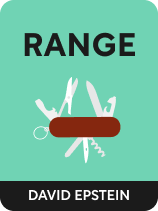

This article is an excerpt from the Shortform book guide to "Range" by David J. Epstein. Shortform has the world's best summaries and analyses of books you should be reading.
Like this article? Sign up for a free trial here .
Is it better to have a wide range of skills or be an expert in one specialty? What are the downsides of being an expert in one field?
In his book Range, David Epstein explains why, contrary to traditional belief, it’s better to have a wide variety of general skills rather than being an expert in one specialty. There are three major reasons why the specialist path falls short.
Read more to learn about the generalist vs. specialist conundrum.
Why the Specialist’s Path to Excellence Falls Short
According to Epstein, the traditional path to excellence has been more or less treated as common sense for years. Obviously, if you want to get good at something, you have to practice a lot. By this logic, the path to success is to start training as early as possible.
If you believe in a purely linear relationship between practice time and success, specializing at a young age and never deviating from a given path would allow humans to accomplish maximum levels of greatness.
(Shortform note: This “traditional path to excellence” rose to prominence in recent years due in large part to Malcolm Gladwell’s 2008 book Outliers. Gladwell’s famed “10,000-hour rule” states that the way to become a master in any field is to spend 10,000 hours practicing. He attributes the success of virtuosos such as Mozart, the Beatles, and Bill Gates not to inherent talent, but to the sheer volume of time they spent practicing.)
However, Epstein argues that in the real world, specialization is a far less reliable life strategy than we would expect, especially in modern times. This is true for a number of reasons why you should be a generalist vs. a specialist.
Reason #1: The World Is Unpredictable
The main reason specialization isn’t ideal is that the world is far more unpredictable than we’d like to believe. Epstein distinguishes between “kind” and “wicked domains”—what we’ll call Stable and Unstable Environments.
Stable Environments are settings in which the ways to achieve success are easily understood and unchanging. Games with clearly defined rules such as basketball or billiards are Stable Environments, as are simple procedural jobs, like installing circuit boards on an assembly line. Unstable Environments are settings in which the ways to achieve success are unclear and constantly changing. As a result, training in an Unstable Environment isn’t guaranteed to make you better. The worlds of business and science are examples of Unstable Environments—in fact, almost every environment in the “real world” is unstable to a certain degree.
Epstein argues that, because they assume that the world is a largely Stable Environment, specialists strive for efficiency above all else. They assume that to reach the top of your field, all you need to do is accumulate skill as quickly as possible. Generalists, on the other hand, recognize that we live in an unstable world—it’s impossible to perfectly predict what experience will be valuable to you—“efficient” narrow training won’t necessarily pay off. Likewise, experience that feels like a waste of time often pays off in ways you could never have imagined, as we’ll see throughout this guide.
| The Ludic Fallacy Coined by Nassim Nicholas Taleb in his book The Black Swan, the “Ludic Fallacy” refers to the misapplication of Stable Environment rules to an Unstable Environment. The word “Ludic” comes from the Latin word ludus, meaning “game,” as people falsely assume that the same strategies used to calculate probability within a game can be used in the real world. For example, Taleb explains that casinos calculate their real-world risk using the same strategies they use to calculate risk within a game like blackjack. They spend millions of dollars on high-tech security systems designed to prevent people from cheating, which, according to their calculations, profitably mitigates their risk. However, in the Unstable Environment of the real world, the largest losses never come from the places you’d expect, making the goal of accurately calculating risk impossible. Taleb visited a casino that lost $100 million dollars after one of its entertainers was mauled by his own tiger, had to pay a gargantuan fine to the IRS after an otherwise reliable employee forgot to send in certain tax forms for years, and had to pay the ransom for the kidnapping of the casino owner’s daughter. These losses cost 1,000 times more than the cheating losses predicted by their risk analysts. Statistical models like the one the casino used to calculate risk fail in Unstable Environments. Specialists’ path to success fails in much the same way—as we’ll see, they fail to realize that their narrow, inflexible plans keep them from taking advantage of the unpredictable. |
Reason #2: Specialization Is Quickly Becoming Obsolete
According to Epstein, another reason specialization isn’t ideal is that it’s becoming more obsolete as time goes on. We’ve entered the knowledge economy, in which innovation and creative problem-solving are far more valuable than specialized procedures.
Generally speaking, specialization helps you do things you’ve done before, while generalism helps you solve problems you’ve never seen before. Epstein notes that specialization works well for something like chess—chess players recognize game states and board positions, then instinctively utilize the appropriate counterplay.
However, in the mid-20th century, computers rendered many specialized procedural jobs obsolete. The qualities of tasks that make them suitable for specialization—repeated recognizable patterns, unchanging rules—also make them suitable for automation.
In the modern world, knowing how to perform specialized procedures isn’t enough to ensure job security. Epstein notes that modern problems aren’t like chess games—they’re one-of-a-kind, and you need to be able to draw on what you’ve learned in unrelated situations in order to solve them. As we’ll see later in this guide, these are skills developed through generalism.
| The Knowledge Economy Requires Us to Solve New Problems In his book Linchpin, author Seth Godin elaborates on Epstein’s argument that today’s knowledge economy requires us to solve new problems in order to thrive. Since the Industrial Revolution, people have flocked to safe corporate jobs where they’re told exactly what to do because they provide a comfortable certainty. These jobs weren’t always fun, but they were low-risk. However, as technology has advanced and labor markets have developed, specialized jobs that simply consist of “following the rules” have become more and more scarce, driving down wages and killing job security. In Godin’s words, “There are no longer any great jobs where someone else tells you precisely what to do.”Attaining a highly specialized skill seems like a safe bet. But you can earn far more by doing things no one has done before. Godin asserts that in order to succeed in this new economy, you need to do things differently than anyone else. If all you do is fill your expected role, you’ll need to put in a massive amount of work to create even marginally more value than your peers. However, if you start executing on original ideas within your organization, you could deliver something worth hundreds or thousands of times more than someone else doing the same job. As he put it on an episode of The Tim Ferriss Show podcast, “We can’t out-obedience the competition.” Your most valuable contributions will be what your organization isn’t already asking for. |
Reason #3: Modern Technology Replaces Specialization
Epstein argues that as industry and technology have advanced, specialization has only become less valuable.
For much of the 20th century, specialization was handsomely rewarded. Employees stayed with the same companies for decades. Loyalty to the company meant the prospect of promotion, and pension plans for long-term employees were common.
However, computers rendered many specialized procedural jobs obsolete. Epstein points out that the qualities of tasks that make them suitable for specialization—repeated recognizable patterns, unchanging rules—also make them suitable for automation.
Today, we’ve entered the era of the “knowledge economy,” where the ability to innovate and generate good ideas has grown to define success.
The advent of artificial intelligence and machine learning has only intensified automation’s threat to specialized workers. For example, IBM has recently developed a chatbot called Watson Assistant that could make call-in customer service representatives obsolete. Similarly, the Internet has increased the ease with which we can access knowledge, further devaluing in-house specialists. A significant amount of expert knowledge is now online.
| How to Be a Linchpin in the Knowledge-Economy In his book Linchpin, author Seth Godin elaborates on Epstein’s argument that today’s knowledge economy requires us to become one-of-a-kind commodities in order to thrive. Since the Industrial Revolution, people have flocked to safe corporate jobs where they’re told exactly what to do because they provide a comfortable certainty. These jobs weren’t always fun, but they were low-risk. However, as technology has advanced and labor markets have developed, jobs that simply consist of “following the rules” have become more and more scarce, driving down wages and killing job security. In Godin’s words, “There are no longer any great jobs where someone else tells you precisely what to do.”Attaining a highly specialized skill seems like a safe bet. But if you bind yourself to a single specialized path, you’ll never stand out from others who do the same. Godin asserts that in order to succeed in this new economy, you need to do things differently than anyone else. If all you do is fill your expected role, you’ll need to put in a massive amount of work to create even marginally more value than your peers. However, if you start executing on original ideas within your organization, you could deliver something worth hundreds or thousands of times more than someone else doing the same job. As he put it on an episode of The Tim Ferriss Show podcast, “We can’t out-obedience the competition.” Your most valuable contributions will be what your organization isn’t already asking for. |

———End of Preview———
Like what you just read? Read the rest of the world's best book summary and analysis of David J. Epstein's "Range" at Shortform .
Here's what you'll find in our full Range summary :
- Why it's better to be proficient in a range of skills rather than becoming a specialist in one
- Why you're never “too late” to pursue something you’re interested in
- Why the nontraditional background of a generalist gives them an edge






